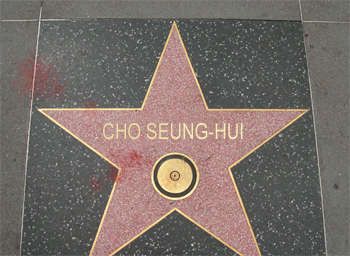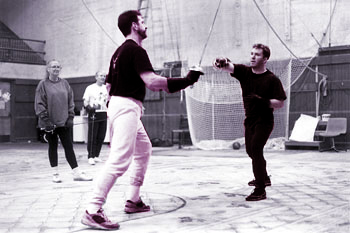Virginia Tech Massacre
Virginia Tech Massacre was a macabre-themed semi-musical play written by Virginia Tech student and intellectual Cho Seung Hui, exclusively performed for the first and only time at the Virginia Tech Theatre on April 16, 2007, for which it received rave reviews and heavy media coverage. It was lauded as the "greatest play of the century" by many critics, and Cho was posthumously praised as a theatrical genius. He would've won many awards for his writing and starring of the play, had he not killed himself. In it were themes of romance, conflict, and humor. But mostly conflict.
Synopsis
The play follows the anti-hero and, perhaps paradoxically, the protagonist Cho. Cho is a distressed and misunderstood Asian-American struggling to excel educationally.[1] His parents are pressuring him to do better, and it is taking its toll.[2] He becomes even more distressed when his only friends Ben and Mark (an apparent pun on Shakespeare's Romeo and Juliet's Benvolio and Mercutio) leave for a foreign college to pursue careers in art (one of the very first acts of the play). An overwhelming feeling of loneliness is felt as it is apparent that Cho is an incredible loser. At this point, the play departs on a soliloquy, where we are introduced to the inner machinations of said loser's mind. Through incomprehensible babble, one gets their first glimpse of Cho's inevitable madness. In a stunningly candid section of this digression, Cho tells us "I'm going to go mad. It's inevitable." After this, we return to the storyline, which proceeds to tell of a depressed Cho. The only thing he finds solace in is writing very dark stories in his college English writing course. One of Cho's essays, called The Soul from Seoul, is played out for act two. In it, Cho makes articulate references to violence. Below is an excerpt:
| “ | Why then, O brawling love, O loving hate, must I be damned to Warcraft and lonely hours? I swear by my level 62 mage that I shall seek out at least 32 innocents someday and shoot them all with two semi-automatic pistols, before turning the empathetic barrel to myself. | ” |
- -- Paragraph three of The Soul from Seoul
Act three proves to be more humorous and romantic as Cho meets his soon-to-be imaginary girlfriend Miranda[3] in an online chatroom. Cho's character, in another startlingly touching scene, describes her as "A female, having large breasts and a burning love for my personage. And by personage, I mean sex. Eth." Miranda proves to be an affectionate and flattering character, and later, a subtle antagonist of the story.
When they eventually meet, hilarity ensues when Cho tells Miranda the infamous The Aristocrats joke. The exchange goes something like this.
Cho: Two guys walk into a talent agency with a dog, a leash, and a woman. The dog runs free while the men rape the woman in a threesome before anally penetrating each other. The Aristocrats.
Miranda: Ah, I simply love your dashing and cavalier sense of humor. Your baby-like face sends chills down my spine, and I spend many a night ponderously pleasuring myself at the thought of your tender love. Whenever you say "I'M GOING FUCKING INSANE YOU BITCH!" and smack me around, I get more and more aroused until I can hardly stand it anymore. Let us have passionate coitus, I want you to ride me doggy style. I want to see your face (which looks like that of a six-year-old) contorted in pleasure.
This being the icebreaker, Miranda and Cho proceed to round the bases in an enchantingly intimate love scene.
Act four marks the deterioration of Cho's world when Miranda ends their relationship. As they have already participated in the obligatory intimate love scene (which was, in this case, used to show intimate love), Cho is crushed, and he once again falls into depression. During one scene, a raven finds its way into Cho's flat. Cho, frustrated because he could not eat the bird[4] goes mad. The raven then begins to mock Cho as Cho vainly questions the raven about his beloved Miranda, as Cho mistook the raven for having a mysterious "wisdom" characteristic due to its perching on top of a bust of Idiocrates.
Cho: I shall see my beloved Miranda...?!
Raven: Nah.
Cho: Just once more, I shall excite in her sight?
Raven: Nope.
Cho: Aren't you supposed to say something else?
Raven:
Cho: Miranda?
Raven: NO!
This sort of delusion is repeated many times in the ensuing scenes, prompting the professors at the Virginia Tech English department to recommend Cho for psychiatric evaluation. At this time, a narrator steps onstage and conveniently recounts for the nonchalant viewer just how many injustices have been committed against Cho. He explains that between his struggle for grades, the loss of his only friends[5], his imaginary online girlfriend breaking up with him and undergoing regular psychiatric appointments, Cho had no choice but to do what he does next. Cutting to the action, we see Cho purchase two handguns and load them with bullets. He briefly practices cool poses with the guns in a full-length mirror in his apartment, before stepping outside into the bright sun over Virgina Tech campus. The voice of Miranda is heard throughout this poignant scene, which culminates into Cho killing 32 people and then himself. The final words are Miranda's: "I want you to ride me doggy style." The curtains close and the crowd's response is ecstatic.
Play Map
- Act I
- Introduction
- Ben & Mark's Departure
- Act II
- Writings of a Madman
- Cho's Heart's Overture
- Act III
- I Knew She'd Be Mine When She Asked For My A/S/L
- The Aristocrats
- Act IV
- Destroy my Limerence
- The Raven Who Wouldn't Say "Nevermore"
- Climax & Finale
Reactions & Criticism
“Some of the actors' families were in tears. Tears of joy! Everybody who saw it had the same reaction. It was everything a play should be. They were all so incredibly talented on stage.”
– Play critic on Virginia Tech Massacre

Even the most jackass-ly of jackass critics agreed that "Virginia Tech Massacre" was a poignant and iconic milestone in theatre. Some even called it "the greatest play of the century"[6]. Rolling Stone Magazine called it "sad and tragic." A movie adaptation, set to be directed by Peter Jackson, is set for release by 20th Century Fox (in tandem with their other tragic hit "If I Did It, Here's How I Did It"). Jackson is expected to add three hours to the already epic play's storyline, topping it out at 7.5 hours long [7] Many are opposed to this however, as they believe that a movie cannot accurately depict the angst portrayed so brilliantly onstage. Unfortunately, this is impossible, as Cho only wanted it performed once, playing "himself." As such, Bobby Lee is set to star.
Film critic Ryan Sands felt that the play had a much deeper meaning regarding social classes. Indeed, in the play, Cho makes mention of "rich" or "snobby" individuals. "I hate rich and/or snobby individuals," he candidly states. Sands goes on to explain that the Virginia Tech Hokies are a symbol, and represent one element of Karl Marx's conflict theory (explained in his treatise on Communism[8]), the bourgeoisie. Conversely, Cho represents the proletariat. By killing 32 Hokies, Cho's actions are a reflection of Marx's predicted overthrow of the bourgeoisie by the proletariat. Of course, the only flaw in this outlook on the play is that Cho too was a student at Virginia Tech, making him a Hokie as well. Unfortunately, this also presents another problem: as he is both, his final suicide presents a sort of Catch-22. It is inferred from this that at this point in the writing process Cho was too emotional to write anything original, and just stole from whatever book was nearest to him at the moment.
Influences
Cho Seung Hui noted some of his major influences as being Eric Harris' and Dylan Klebold's 1999 play Columbine (which had similar themes) and dark romantic literature, such as Edgar Allen Poe's The Raven and various works from Nathaniel Hawthorne. Elements of Shakespeare are abundant in the play, yet Cho never cited Willie as an influence. For humor, Cho claims to have been influenced by the works of Neil Simon, and to a lesser extent, Woody Allen. Cho also stated that many of the events in the play were based off real-life experiences. In fact, the oft-overlooked subtitle to the play is "In Regards to Future True Events Wherein I Will Act Out This Play in All of its Morbidity and Mortality. The Aristocrats." Much time has been devoted to the understanding of this cryptic message, and it is yet to be figured out.
Citations
- ↑ This is seen as the first employment of irony in the play (an Asian-American struggling to achieve good grades).
- ↑ This is seen as the second employment of irony in the play (an Asian-American's parents pressuring him to do well).
- ↑ In the original play, Miranda is played by Nobody. However, due to lackluster reaction, she was soon replaced with the also waif-like Courtney Love. Audience reactions generally proved to be better, with the majority of people saying that it was "funnier" and "much more awkward to watch" with the latter taking the role.
- ↑ Again, another racial reference about Asians.
- ↑ This is considered the play's primary point of realism (an Asian-American struggling socially)
- ↑ STAR Magazine, but still
- ↑ Still shorter than King Kong
- ↑ After all, he is Asian.



